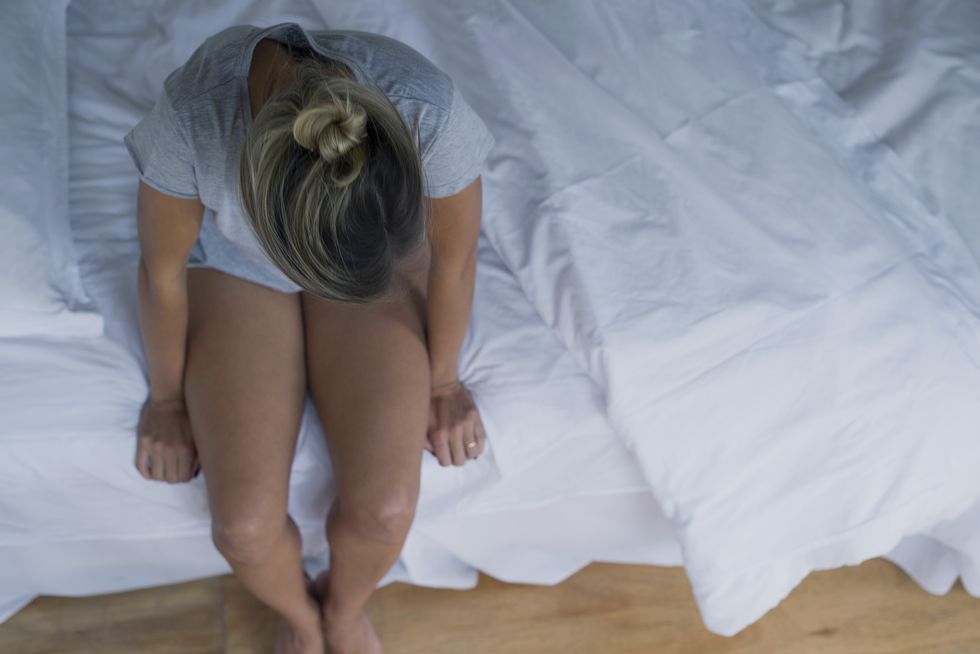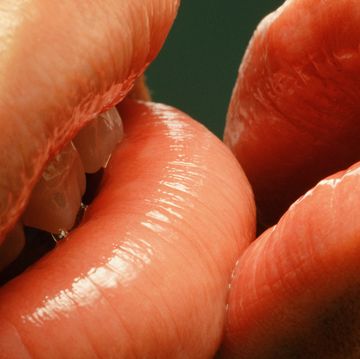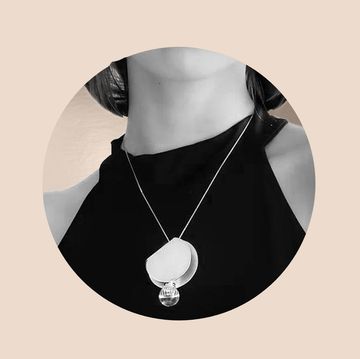Jenny's* boss had just left the office to grab lunch when she felt the overwhelming urge to start touching herself.
Surrounded by her colleagues - one was sat less than two metres away - the then 29-year-old slowly slid her right hand up her skirt, down the front of her tights and gently began rubbing her clitoris.
It took approximately 10 minutes for her to orgasm.
'If I hadn't masturbated at that moment, I don't know what I'd have done,' she tells ELLE UK.
'Rather than going to the toilet, I liked the fact people could've caught me at any second. It gave me a thrill.'
Addiction or behavioural disorder?
Did Jenny have a problem? Despite the above anecdote providing what one assumes is ample evidence, it took her a while to come to terms with the fact that she did, in fact, have a sex addiction.
'There are moments when I get really horny and if I don't do anything about it I just go crazy,' she explains.
While the causes are yet unknown, sex addiction is widely believed to derive from childhood or adolescence, often resulting from an early emotional or physical trauma, sexual abuse, neglect or depression.
According to relationship counselling service Relate, sex addiction can be described as any sexual activity that feels 'out of control' and involves frequent self-destructive or high-risk activity that isn't 'emotionally fulfilling, that one is ashamed of and that one is unable to stop, despite it causing repeated problems'.
For some addicts, as in Jenny's case, sexual compulsions can come at any moment and is commonly thought to be a way of anaesthetising or coping with negative thoughts and emotions.
However - unlike alcohol, smoking or drugs - sex addiction (or 'hypersexuality' as it's otherwise known) is a contentious issue that is yet to be recognised by the medical and clinical community as a psychological compulsion. Rather, it is currently regarded as a chronic brain or borderline personality disorder.
'Some doctors don't think it exists because applying medical terminology such as the word 'addiction' to a normal behaviour like sex may pathologise it,' reveals Peter Saddington, a clinical supervisor for Relate.
The root of the problem
Convinced she was abnormal for her inability to orgasm, Jenny bought her first vibrator at the age of 17.
'I remember locking myself in my room one day, lying down on my bed, and being determined to make myself cum. When I did for the first time, it felt amazing. From then on, I got into a routine of using my vibrator at least five or six times a day.'
In Jenny's case, she attributes her addiction and inability to attach emotional value to sex to losing several family members at an early age.
'I lost my mother at the age of nine, my godmother, two uncles and all my godparents in the years to follow. My Dad was the only family I had left.'
However, soon after her mother's death, Jenny's father turned to prostitutes to the numb his own pain, regularly inviting strippers to family dinners ('he was aged 72 and they were in their 20s') and at one point he was seeing her 19-year-old best friend Abbie*.
As a result, Jenny is convinced her father desensitised her to sex. But it wasn't until the 31-year-old met her current partner that she thinks her sex addiction finally came to fruition.
When a love of sex becomes addiction
When Jenny met her boyfriend last year, he was almost six months into a celibacy agreement with a counsellor treating him for sex addiction. Just two weeks after their first date, however, her partner relapsed and it wasn't long before the pair became regulars on the local sex club scene.
'The first time I went [to a sex club] I was a bit nervous,' Jenny admits. 'When I walked in the door, I saw a woman lying on a table with six different men wanking over her body while she gave someone a blow job. I thought it was beautiful.'
At the height of their addiction, Jenny and her boyfriend were spending four nights a week at sex clubs and have spent close to £2,000 over the last year on entry charges alone.
'If we had the chance to go to sex clubs all day, we would,' she admits, saying the only obstacle is childcare for her young daughter from a previous relationship.
Recalling one orgy with at least 10 men and women and several onlookers, Jenny says: 'I remember a mass of bodies and hands touching me all over the place. At one point, my boyfriend put a foot over my vagina to stop people entering me without a condom. I can proudly say I've never had an STI in my life.'
On another occasion, Jenny's boyfriend satisfied one of her favourite fetish desires - public humiliation - by making her squirt across the dance floor 'like a machine gun', throwing a towel on the ground and forcing her to mop it up in front of everyone.
However, after one Fabswingers event (a swingers website where couples organise meet-ups) in Birmingham, the mother-of-one questioned whether her sex addiction could be putting her life in danger.
'My boyfriend was getting the bags out of the car while I went inside the apartment. When I walked into the hallway, I was suddenly greeted by a man who, without even looking at my face, put his hand up my skirt.
'I tried to be civil while pushing him off - after all, I had gone there to have sex – but, sex is always on my terms, otherwise it's rape. I remember thinking, "I'm still a person. This isn't how it usually happens".'
'In that moment, it's easy to see how someone could feel obligated to let someone take advantage of them - the pressure to have sex is there. Fortunately, my boyfriend appeared at the right moment and after some niceties, we made our excuses and left.'
Day-to-day life
As with most compulsive behaviours, sex addicts are known to either binge over a short period or search for their 'fix' several times throughout the day on a regular basis.
'When a sex addict increases their sexual habits, the brain becomes accustomed to higher levels of dopamine (a neurotransmitter that activates the reward centre of the brain) and craves more,' explains clinical supervisor Peter Saddington.
'Many addicts experience a form of escalation, searching for more 'interesting', dangerous or extreme versions of sex in order to get that same level of dopamine,' he adds.
As a result, Jenny's love of orgies, BDSM parties, dominance and submission, and psychological torture has made a significant impact on her day-to-day life.
'Our social lives revolve around sex,' says Jenny. 'Any weekend I'm not looking after my daughter, we'll go to sex clubs, go dogging, or invite people over for sex.'
Friend's birthdays, coffee catch-ups, and days at work have often been missed in preference of finding her next sexual 'hit'.
'I used to carry a silent vibrator in my handbag to use at least six times a day at home or in the toilets at work, but I can only now use it twice a day now, sadly.'
In December, Jenny was diagnosed with multiple sclerosis (MS); a condition which damages the insulating covers of nerve cells in the brain and spinal cord with symptoms ranging from numbness to intense burning pain.
So, how does her illness affect her sex addiction? 'I'm certainly more frustrated because I can't have sex as much as I want to.
'I've ended up in severe pain following two MS relapses and having sex when I know I shouldn't have.'
Looking to the future
Despite promising to tackle the 'stigma' surrounding mental health earlier this year, the Tory government announced five clinical commissioning groups in the UK would be cutting spending on mental health services.
So, when it comes to addressing something as 'taboo' as sex addiction, Saddington argues it's hardly surprising nobody wants to recognise additional psychological conditions.
'If it's not named or accepted by the medical community, it's difficult to find a reason to supply money, services and research,' he explains.
As a result, the NHS is left providing services to treat the symptoms of the problem such as depression, anxiety, suicidal thoughts, and STIs, rather than the cause.
When it comes to treating her own addiction, Jenny admits that, for the moment, she's happy in her 'ignorance' and using sex as a crutch to help her cope with other issues in her life.
'I'm trying to come to term with my MS and my brother currently has terminal cancer, so I don't want to be preached at that my addiction is wrong. I know why I do what I do,' she says.
However, she's not opposed to seeking professional help when and if the time comes.
'I'll probably end up in a wheelchair soon enough because of my MS and my sex life will be well and truly over. I'm going to have to deal with my addiction at some point but, for now, it's not hurting anyone so, what's the problem?'
*Names have been changed
For more information or to speak to someone who can help, head to relationship service RELATE.

Katie O'Malley is the Site Director on ELLE UK. On a daily basis you’ll find Katie managing all digital workflow, editing site, video and newsletter content, liaising with commercial and sales teams on new partnerships and deals (eg Nike, Tiffany & Co., Cartier etc), implementing new digital strategies and compiling in-depth data traffic, SEO and ecomm reports. In addition to appearing on the radio and on TV, as well as interviewing everyone from Oprah Winfrey to Rishi Sunak PM, Katie enjoys writing about lifestyle, culture, wellness, fitness, fashion, and more.
















